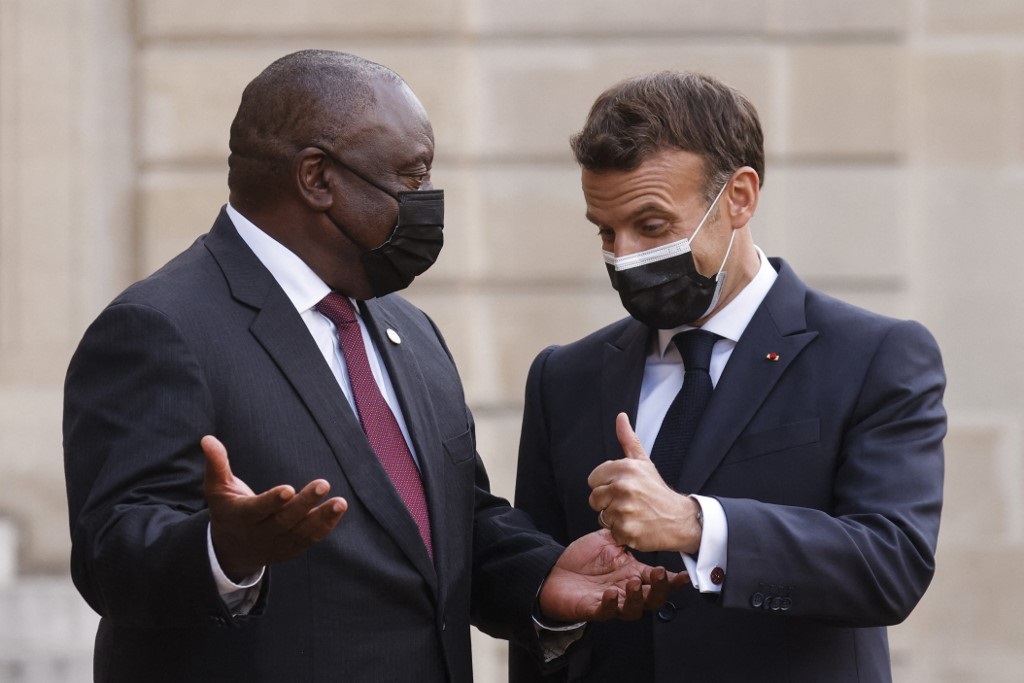
- South Africa will get a new hub to manufacture Covid-19 messenger RNA vaccines.
- President Cyril Ramaphosa said the hub will also benefit the rest of the continent.
- French President Emmanuel Macron has pledged his support for this hub and future initiatives.
South Africa is set to get a new hub to manufacture vaccines, President Cyril Ramaphosa has announced.
He said, although it was historic and a step in the right direction, it would not stop South Africa from campaigning for the waiver of the agreement on Trade-Related Aspects of Intellectual Property Rights (TRIPS) to enable poorer countries to manufacture their own vaccines.
"In Africa, the number of #COVID19 cases and deaths increased by almost 40% in the past week, and in some countries the number of deaths tripled or quadrupled"-@DrTedros
— World Health Organization (WHO) (@WHO) June 21, 2021
Ramaphosa addressed a joint press conference with French President Emmanuel Macron on Monday evening, facilitated by the World Health Organisation (WHO).
Macron, who called Ramaphosa "my friend", said this partnership was the result of his state visit to South Africa at the end of last month.
South Africa's Biovac Institute, which has a partnership with France, has partnered with Afrigen Biologics and Vaccines, a network of universities, and the Africa Centres for Disease Control and Prevention to establish Africa's first Covid messenger RNA vaccine technology transfer hub.
The World Health Organisation on 16 April issued a call for Expression of Interest to establish such hubs to scale-up production and access to Covid-19 vaccines, WHO Director-General Tedros Adhanom Ghebreyesus said.
Ramaphosa said the hub was the start of a process, and the laying of a foundation for health security for the world's most vulnerable.
"We would like the negotiations taking place [on the TRIPS waiver] to proceed with speed," Ramaphosa said.
He said:
Other WHO officials at the briefing, however, pointed out that social prevention measures, such as mask-wearing, the washing of hands and avoiding closed spaces and crowds were still among the most effective for bringing down infections.
Ramaphosa said the new initiative shouldn't just be seen as benefiting South Africa, but the entire African continent.
He said:
"This landmark initiative is a major advance in the international effort to build vaccine development and manufacturing capacity that will put Africa on a path to self determination," Ramaphosa continued.
"South Africa welcomes the opportunity to host a vaccine technology transfer hub and to build on the capacity and expertise that already exists on the continent to contribute to this effort."
Macron said it was a, "... great day for Africa" and for, "... all those who work towards a more equitable access to health products.
"I am proud for Biovac and our South African partners to have been selected by WHO, as France has been supporting them for years."
He said France would keep supporting future initiatives.
WHO officials could not give a timeline for how long it would take for the first vaccines to be manufactured as a result of the hub, but estimated that it could take at least about nine to 12 months.
Technology transfer hubs are training facilities where the technology is established at industrial scale and clinical development performed, according to a WHO press release.
"Interested manufacturers from low- and middle-income countries can receive training and any necessary licenses to the technology. WHO and partners will bring in the production know-how, quality control and necessary licenses to a single entity to facilitate a broad and rapid technology transfer to multiple recipients," the release states.
